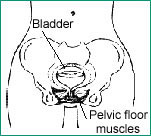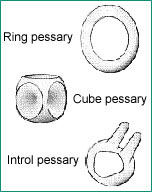Urologic Diseases Dictionary: P - T
Urologic Diseases Dictionary Index
A
B
C
D
E
G
H
I
K
L
N
O
P
S
T
U
V
P
painful bladder syndrome:
See interstitial cystitis.
pelvic (PELL-vik) floor muscles:
Muscles that support the bladder.
pelvis (PELL-vis):
The bowl-shaped bone that supports the spine and holds up the digestive, urinary, and reproductive organs. The legs connect to the body at the pelvis.

Pelvis
penis (PEE-nis):
The male organ used for urination and sex.
percutaneous (PER-kyoo-TAY-nee-us) nephrolithotomy (NEF-roh-lih-THAH-tuh-mee):
A method for removing kidney stones via keyhole surgery through the back.
pessary (PESS-uh-ree):
A specially designed object worn in the vagina to hold the bladder in its correct position and prevent leakage of urine. Pessaries come in many shapes and sizes.

Pessaries
Peyronie's (pay-ROH-neez) disease:
A plaque (hardened area) that forms on the penis, preventing that area from stretching. During erection, the penis bends in the direction of the plaque, or the plaque may lead to indentation and shortening of the penis.
prostate (PRAH-state):
In men, a walnut-shaped gland that surrounds the urethra at the neck of the bladder. The prostate supplies fluid that goes into semen.
prostate-specific antigen (AN-tih-jen) (PSA):
A protein made only by the prostate gland. High levels of PSA in the blood may be a sign of prostate cancer.
prostatitis (PRAH-stuh-TY-tis):
Inflammation of the prostate gland. Chronic prostatitis means the prostate gets inflamed over and over again. The most common form of prostatitis is not associated with any known infecting organism.
proteinuria (PRO-tee-NOOR-ee-uh):
A condition in which the urine contains large amounts of protein, a sign that the kidneys are not functioning properly.
pyelonephritis (PY-loh-nef-RY-tis):
An infection of the kidneys, usually caused by a germ that has traveled up through the urethra, bladder, and ureters from outside the body.
[Top]
S
sphincter (SFINK-tur):
A round muscle that opens and closes to let fluid or other matter pass into or out of an organ. Sphincter muscles keep the bladder closed until it is time to urinate.
stress urinary (YOOR-ih-NEHR-ee) incontinence (in-KON-tih-nents):
Leakage of urine caused by actions—such as coughing, laughing, sneezing, running, or lifting—that place pressure on the bladder from inside the body. Stress urinary incontinence can result from either a cystocele (fallen bladder) or weak sphincter muscles.
struvite (STROO-vite) stone:
A type of kidney stone caused by infection.
[Top]
T
transurethral (TRANZ-yoo-REE-thrul):
Through the urethra. Several transurethral procedures are treatments for benign prostatic hyperplasia:
- TUIP (transurethral incision of the prostate): widens the urethra by making a few small cuts in the bladder neck, where the urethra joins the bladder, and in the prostate gland itself.
- TUMT (transurethral microwave thermotherapy): destroys excess prostate tissue interfering with the exit of urine from the body by using a probe in the urethra to deliver microwaves.
- TUNA (transurethral needle ablation): destroys excess prostate tissue with electromagnetically generated heat by using a needle-like device in the urethra.
- TURP (transurethral resection of the prostate): removes the excess prostate tissue by using an instrument with an electrical loop.

TURP
[Top]
Urologic Diseases Dictionary Index
A
B
C
D
E
G
H
I
K
L
N
O
P
S
T
U
V
|






